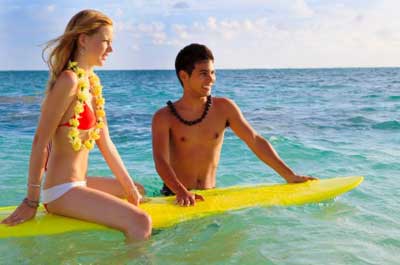Todd: So, hello, Mitchell, right?
Mitchell: Yes. Nice to meet you.
Todd: Nice to meet you. Now Mitchell, you're from Hawaii?
Mitchell: Yes, I am.
Todd: That must be pretty cool. What's it like growing up in Hawaii?
Mitchell: Hawaii's really different compared to mainland America. I'm originally born in Ohio, but I moved to Hawaii when I was two. The culture's really different. Since everyone came from different backgrounds, for example, people, Chinese people, Philliphino people, Korean people, they all came from the plantation days. It's a mixed culture, and for example if, my friend's in Hawaii, if I look at one person, I don't know what nationality or race they are, because they have like six races in them.
Todd: Really, yeah.
Todd: Well how about in Hawaii, when you think of Hawaii, what do you think of? Is it weather or food?
Mitchell: Weather, food, and beach.
Todd: The beach. OK. Yeah, what island are you from by the way?
Mitchell: I'm from Ohau.
Todd: Ohau, OK, so obviously Ohau's more like...
Mitchell: Yeah, it's the capital of Hawaii. Honolulu is the capital. Ohau's the most populated island. Our population now is about one million.
Todd: Oh, really. And the whole island is one million.
Mitchell: Our own island, that is one million.
Todd: Well, usually how many tourists are actually on the island at the same time?
Mitchell: I would think at least 20,000.
Todd: Yeah, that's quite a bit.
Mitchell: Yeah.
Todd: Yeah. So in Hawaii is it warm all year round? Sunny, and?
Mitchell: Well, the coldest it gets is when you are sleeping in the winter time, it'll hit like 69 degrees farhenheit and that's when people are throwing on sweaters, the whole like winter.
Todd: The coldest it gets is 70 degrees.
Mitchell: Right, around like 66 I would think, when you are sleeping.
Todd: Man, wow, actually, that's farhenheit, that's the American system. How warm is that in centigrade? About 25?
Mitchell: 24, 25?
Todd: Maybe, I don't even know. Interesting. What do you think is the best thing about living in Hawaii?
Mitchell: It'd have to be just the environment itself. There's, you know, everyone's like, we say 'Ohana' means family. Everyone treats everyone like, for example my friend's parents, I call them 'auntie' or something like that because they treat me as like I'm their own kids. It's the culture in general. It's a warm feeling culture. It's like, their not as shady. They'll welome you. When you come in they'll start feeding you food, you know it's like, you're not even hungry and they're feeding you. Also, you can't beat the beach. Surfing, body boarding, body surfing, canoe paddling.
Todd: Ah, man, it sounds pretty good. OK, thanks Mitchelll.
Mitchell: No worries. Thank you.
plantation days
The Chinese, Filipinos, Koreans, they all came from the
plantation days.
A 'plantation' is a very large farm that is owned by one person, but where many local people work. Many times these workers worked very hard for very little money and life was difficult. The 'plantation days' refers to the time when most people worked on plantations. In the case of Hawaii, many immigrants worked on fruit plantations when they first arrived. Notice the following:
- A lot of the cultural in this area was influenced by
plantation days.
- Many of these songs were written during plantation days.
by the way
What island are you from, by the way?
You can use the phrase 'by the way' when the the comment or question you are going to make is asking for or giving additional information. Notice the following:
- I wanted to tell you, by the way, that I really enjoyed
the book you let me borrow.
- By the way, where did you get those earrings?
capital
Oahu is the capital of Hawaii, and Honolulu is the capital
of Oahu.
The 'capital' of a place is the location of its governmental offices. In many cases the capital is a large city. Notice the following:
- People are having a protest in the capital today.
- There are a lot of interesting museums in the capital
city.
throwing on or throw on
When it hits like 69 degrees Fahrenheit, that's when people
are throwing on sweaters.
Used like this 'throw on' is an informal way to say 'put on.' When you talk about 'throwing something on' it usually means that something is put on quickly or without a lot of care. Notice the following:
- You can just throw on a pair of my shoes. We are just
going outside for a few minutes.
- Hold on a second. I'm just going to throw on a light
jacket.
shady
It's a warm feeling culture, and it's like they're not as
shady.
A 'shady' person is someone who is dishonest or you feel as though you can't trust. Notice the following:
- Do you feel like all the people in this town are a
little shady?
- I wanted to buy a new phone, but I felt like the
salesman was a little shady.
no worries.
No worries; thank you, too.
'No worries' is another way to tell someone 'don't worry' or 'no problem.' Notice the following:
- No worries. We will find a way to work this out.
- No worries about being late. I was busy doing things
around here.
Vocabulary Quiz
threw • shady • worries
Mitchell talks about how Hawaii is different than the rest of the United States.




















